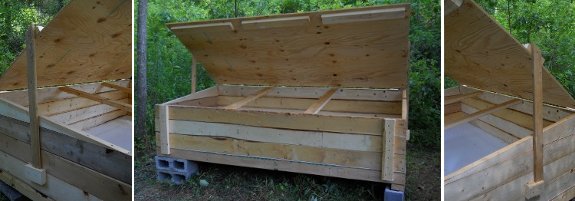
DIY worm bin 3.0
We had our helper build
another worm
bin today.
He took some initiative and
improved the lid so it can easily be held up with the above side pieces.
It's the best worm bin yet,
and we still plan to build more.
Want more in-depth information? Browse through our books.
Or explore more posts by date or by subject.
About us: Anna Hess and Mark Hamilton spent over a decade living self-sufficiently in the mountains of Virginia before moving north to start over from scratch in the foothills of Ohio. They've experimented with permaculture, no-till gardening, trailersteading, home-based microbusinesses and much more, writing about their adventures in both blogs and books.
Want to be notified when new comments are posted on this page? Click on the RSS button after you add a comment to subscribe to the comment feed, or simply check the box beside "email replies to me" while writing your comment.


Chris --- I know! I'm highly impressed!
Scott --- See this post for a rundown on how a slightly smaller bin did over the last year. I think that if I'd managed it better, we would have come into spring with more worms, but we still had enough to repopulate the bin. Since this bin is slightly deeper, the worms should do even better.
Another option if you're worried about overwintering is to put the bin in the ground. But our groundwater is very high, so we didn't want the worms to drown, and I didn't want to leach a lot of nutrients out of the castings.